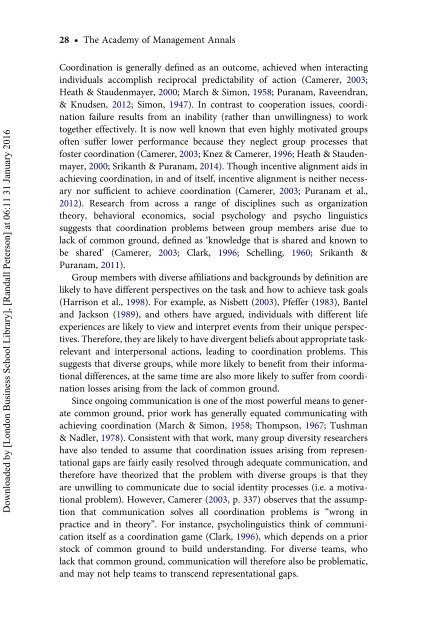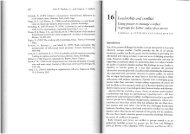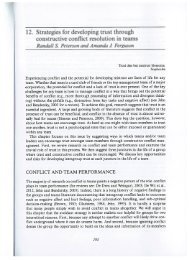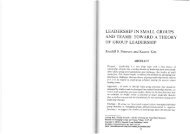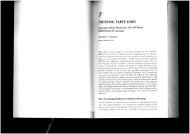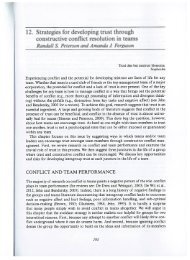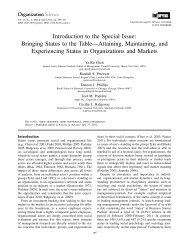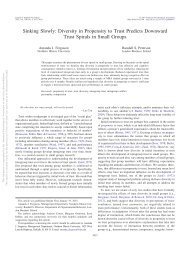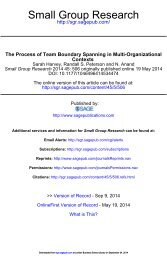A Dynamic Perspective on Diverse Teams: Moving From The Dual Process Model to A Dynamic Coordination-Based Model of Diverse Team Performance - Kannan Srikanth, Sarah Harvey & Randall Peterson
The existing literature on diverse teams suggests that diversity is both helpful to teams in making more information available and encouraging creativity and damaging to teams in reducing cohesion and information sharing. Thus the extant literature suggests that diversity within teams is a double-edged sword that leads to both positive and negative effects simultaneously.
The existing literature on diverse teams suggests that diversity is both helpful to teams in making more information available and encouraging creativity and
damaging to teams in reducing cohesion and information sharing. Thus the
extant literature suggests that diversity within teams is a double-edged sword
that leads to both positive and negative effects simultaneously.
You also want an ePaper? Increase the reach of your titles
YUMPU automatically turns print PDFs into web optimized ePapers that Google loves.
28 † <strong>The</strong> Academy <strong>of</strong> Management Annals<br />
Downloaded by [L<strong>on</strong>d<strong>on</strong> Business School Library], [<strong>Randall</strong> Peters<strong>on</strong>] at 06:11 31 January 2016<br />
Coordinati<strong>on</strong> is generally defined as an outcome, achieved when interacting<br />
individuals accomplish reciprocal predictability <strong>of</strong> acti<strong>on</strong> (Camerer, 2003;<br />
Heath & Staudenmayer, 2000; March & Sim<strong>on</strong>, 1958; Puranam, Raveendran,<br />
& Knudsen, 2012; Sim<strong>on</strong>, 1947). In c<strong>on</strong>trast <strong>to</strong> cooperati<strong>on</strong> issues, coordinati<strong>on</strong><br />
failure results from an inability (rather than unwillingness) <strong>to</strong> work<br />
<strong>to</strong>gether effectively. It is now well known that even highly motivated groups<br />
<strong>of</strong>ten suffer lower performance because they neglect group processes that<br />
foster coordinati<strong>on</strong> (Camerer, 2003; Knez & Camerer, 1996; Heath & Staudenmayer,<br />
2000; <strong>Srikanth</strong> & Puranam, 2014). Though incentive alignment aids in<br />
achieving coordinati<strong>on</strong>, in and <strong>of</strong> itself, incentive alignment is neither necessary<br />
nor sufficient <strong>to</strong> achieve coordinati<strong>on</strong> (Camerer, 2003; Puranam et al.,<br />
2012). Research from across a range <strong>of</strong> disciplines such as organizati<strong>on</strong><br />
theory, behavioral ec<strong>on</strong>omics, social psychology and psycho linguistics<br />
suggests that coordinati<strong>on</strong> problems between group members arise due <strong>to</strong><br />
lack <strong>of</strong> comm<strong>on</strong> ground, defined as ‘knowledge that is shared and known <strong>to</strong><br />
be shared’ (Camerer, 2003; Clark, 1996; Schelling, 1960; <strong>Srikanth</strong> &<br />
Puranam, 2011).<br />
Group members with diverse affiliati<strong>on</strong>s and backgrounds by definiti<strong>on</strong> are<br />
likely <strong>to</strong> have different perspectives <strong>on</strong> the task and how <strong>to</strong> achieve task goals<br />
(Harris<strong>on</strong> et al., 1998). For example, as Nisbett (2003), Pfeffer (1983), Bantel<br />
and Jacks<strong>on</strong> (1989), and others have argued, individuals with different life<br />
experiences are likely <strong>to</strong> view and interpret events from their unique perspectives.<br />
<strong>The</strong>refore, they are likely <strong>to</strong> have divergent beliefs about appropriate taskrelevant<br />
and interpers<strong>on</strong>al acti<strong>on</strong>s, leading <strong>to</strong> coordinati<strong>on</strong> problems. This<br />
suggests that diverse groups, while more likely <strong>to</strong> benefit from their informati<strong>on</strong>al<br />
differences, at the same time are also more likely <strong>to</strong> suffer from coordinati<strong>on</strong><br />
losses arising from the lack <strong>of</strong> comm<strong>on</strong> ground.<br />
Since <strong>on</strong>going communicati<strong>on</strong> is <strong>on</strong>e <strong>of</strong> the most powerful means <strong>to</strong> generate<br />
comm<strong>on</strong> ground, prior work has generally equated communicating with<br />
achieving coordinati<strong>on</strong> (March & Sim<strong>on</strong>, 1958; Thomps<strong>on</strong>, 1967; Tushman<br />
& Nadler, 1978). C<strong>on</strong>sistent with that work, many group diversity researchers<br />
have also tended <strong>to</strong> assume that coordinati<strong>on</strong> issues arising from representati<strong>on</strong>al<br />
gaps are fairly easily resolved through adequate communicati<strong>on</strong>, and<br />
therefore have theorized that the problem with diverse groups is that they<br />
are unwilling <strong>to</strong> communicate due <strong>to</strong> social identity processes (i.e. a motivati<strong>on</strong>al<br />
problem). However, Camerer (2003, p. 337) observes that the assumpti<strong>on</strong><br />
that communicati<strong>on</strong> solves all coordinati<strong>on</strong> problems is “wr<strong>on</strong>g in<br />
practice and in theory”. For instance, psycholinguistics think <strong>of</strong> communicati<strong>on</strong><br />
itself as a coordinati<strong>on</strong> game (Clark, 1996), which depends <strong>on</strong> a prior<br />
s<strong>to</strong>ck <strong>of</strong> comm<strong>on</strong> ground <strong>to</strong> build understanding. For diverse teams, who<br />
lack that comm<strong>on</strong> ground, communicati<strong>on</strong> will therefore also be problematic,<br />
and may not help teams <strong>to</strong> transcend representati<strong>on</strong>al gaps.


